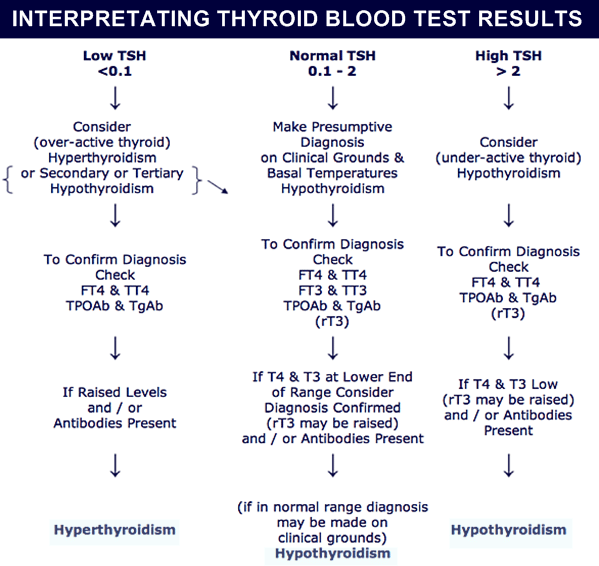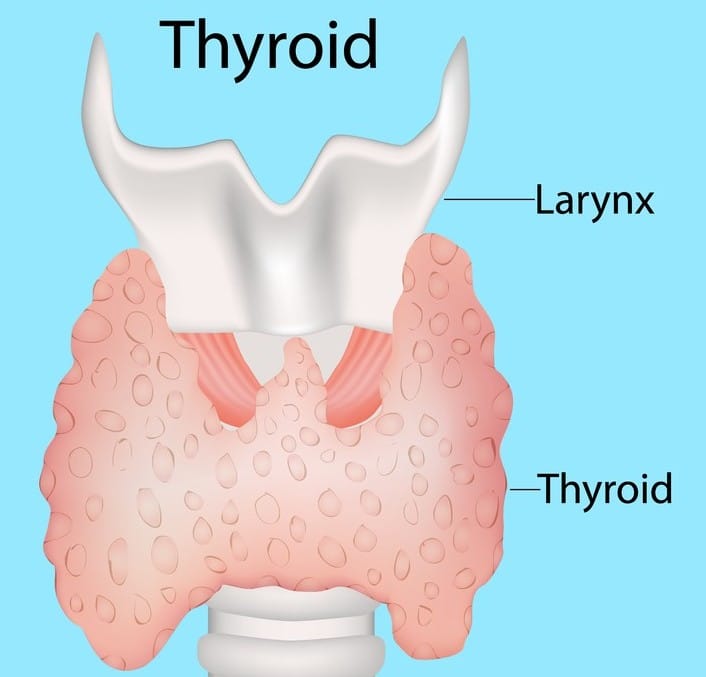Low Thyroid Function From Thyroid Gland Damage
The first and most obvious source of weight gain among patients with Hashimotos is that of thyroid function.
In order to understand this connection, you have to understand the importance of thyroid hormone as it relates to your metabolism.
Your metabolism, or basal metabolic rate, represents the number of calories that you burn on basic day-to-day functions.
Ranging from things like eating to thinking to breathing, these calories are necessary for keeping you alive.
Your thyroid helps to regulate this number by impacting things like your heart rate, how much cellular energy you produce, and how much heat your body produces.
Patients with low thyroid function see a decline in their basal metabolic rate which results in several things:
- A decrease in their resting heart rate
- A decrease in their body temperature
- Weight gain due to a decrease in whole-body metabolism
Just think about this for a minute:
If you are gaining weight because your metabolism has dropped, do you think that lowering your calories will solve that problem?
Or does it make sense to focus on the root cause of the problem and bring your thyroid back to its normal function?
The answer is obvious.
Spend your time and energy on INCREASING your thyroid function back to whatever its normal was before you developed Hashimotos.
This is the single best and most important action you can take if you have Hashimotos and you are experiencing weight gain.
How can you do that?
Will I Have The Same Dose Of Medication For Hypothyroidism My Entire Life
The dose of your medication can actually change over time. At different points in your life, you may need to have the amounts of medication changed so that it manages your symptoms. This could happen because of things like weight gain or weight loss. Your levels will need to be monitored throughout your life to make sure your medication is working correctly.
Why Does Hypothyroidism Cause Weight Gain
Thyroid hormones regulate your metabolism and the way your body burns calories. If you have hypothyroidism, your body will produce lower levels of thyroid hormones, which will slow your metabolism and cause you to burn calories at a slower rate. A combination of these factors causes weight gain in hypothyroidism, and it is often more noticeable in those with severe symptoms.
You May Like: 3 Types Of Thyroid Cancer
How To Avoid Weight Gain After Thyroid Removal
There are several steps I would recommend to avoiding weight gain after thyroid removal.
- Take your medication as prescribed. Take your medication every day, on an empty stomach, 30-60 minutes before eating. Dont take supplements within 4 hours. By taking your medication regularly, you have the best chance of your labs being accurate.
- Find a doctor you like and who listens to you. You will be seeing your endocrinologist on a regular basis. Make sure you feel comfortable with him or her and can discuss any problems.
- Talk to your doctor about other options. If you still dont feel normal, talk to your doctor about measuring your T3 or other hormones. Maybe you would benefit from supplemental T3. Maybe another hormone or vitamin level is off in your body.
- Stay on top of your lab work. If you start noticing a change in how you feel, talk to your doctor about checking labs.
- Recognize when other things are changing in your body. Are you getting older? More sedentary? Are you going through menopause? Other health issues? Mental health changes? Realize that your thyroid medication is not the only reason you may be gaining weight.
- Talk to your doctor at the first sign of weight gain. Weight gain is always easiest to take care of when it is small. Wouldnt you rather lose 10 pounds than 50 pounds? .
- Live a healthy lifestyle. See my post on Diet After Thyroid Removal for more on this.
T4 Tests In Low And High Thyroid Conditions

T4 is the principal thyroid hormone. The normal range for total T4 is 4.5 to 12.6 , although again, the range may vary slightly from one laboratory to another. Elevated total T4 suggests hyperthyroidism, and low total T4 points to hypothyroidism. Some conditions such as pregnancy or the use of oral contraceptives alters the levels of T4 and T3. In those cases one needs to use the TSH test only. Steroids and chronic disease may actually lower the T4 again use the TSH.
You May Like: Can Thyroid Problems Affect Eyesight
How Much Weight Can You Gain With Hashimotos
I wish I could say there is some magical number and that it will stop but thats not the case.
Weight gain varies from person to person and it largely depends on the severity of your disease.
The worse your Hashimotos and the lower your thyroid function, the more weight you will gain.
On average, most women who develop Hashimotos gain somewhere between 20 and 30 pounds from their thyroid.
This initial weight gain stems from the thyroid but can then spiral as other problems start to stack on top of each other.
Initial weight gain can limit your ability to exercise which causes more weight gain.
This extra weight may result in hormone imbalances to important hormones such as insulin and leptin which may trigger more weight gain and so on.
This type of vicious cycle is typically what causes weight gain in excess of 50 pounds or more in some Hashimotos patients.
For this reason, it is very important that you do whatever it takes to manage your weight before it gets worse!
The more overweight you are and the longer youve been overweight the more difficult it will be to get back to normal.
Better Thyroid Balance Equals Easier Weight Loss
Thyroid-driven weight gain may be stubborn, but you can stop it by regaining control of your body. When you give your thyroid what it needs and encourage healthy thyroid function, you will change how your body looks and feels.
Find out if your weight gain is related to low thyroid take our quiz now.
https://www.redbookmag.com/body/health-fitness/a42341/digestive-problems/
https://www.endocrineweb.com/news/obesity/55275-does-underactive-thyroid-lead-weight-gain-vice-versa
Jeffrey S. Flier, Mark Harris, and Anthony N. Hollenberg. Leptin, nutrition, and the thyroid: the why, the wherefore, and the wiring. J Clin Invest. 2000 Apr 1 105: 859861. doi: 10.1172/JCI9725. https://www.ncbi.nlm.nih.gov/pmc/articles/PMC377492/. Accessed 9.20.17.
https://www.huffingtonpost.com/dr-raphael-kellman/hashimotos-thyroiditis-we_2_b_7118690.html
Alessio Fasano and Terez Shea-Donohue, Mechanisms of Disease: the role of intestinal barrier function in the pathogenesis of gastrointestinal autoimmune diseases, Nature Clinical Practice Gastroenterology & Hepatology 2, 416-422. https://www.ncbi.nlm.nih.gov/pubmed/16265432. Accessed 9.20.17.
You May Like: Cas Score Thyroid Eye Disease
The More Medication Myth
You may have heard that thyroid hormones can be used to lose weight, even in people without thyroid disease. While synthetic thyroid hormones have been used this way in the past, research has shown that most people gain all the weight back once they stop using them. Worse, being on thyroid hormones unnecessarily can result in serious side effects.
For people who are already using levothyroxine, increasing the dose above whats needed can lead to more weight loss, but its usually not significant and those pounds are often gained back once the dose is decreased again.
This is also an unhealthy way to lose weight, as an increased dose is also associated with adverse reactions, including heart issues, insomnia, headaches, menstrual irregularities, and skin rash.
You May Like: Thyroid And Swollen Lymph Nodes
If There Is A Growth What Happens Next
Nodules under a centimeter in size are not likely to be concerning. Larger ones we pay more attention to. Their appearance on an ultrasound can tell us if they are solid, filled with fluid or irregular in shape. If a nodule is concerning enough, a fine needle biopsy to sample the tissue can reveal whether it is cancerous or not. The only real reason to have them removed is if they are cancerous or so large theyre interfering with swallowing or the nerve to nearby vocal cords. If theres cancer, all or part of the thyroid is removed, sometimes followed by treatment with radioactive iodine pills. It is rarely a fatal cancer.
Id estimate that half of women over 50 have thyroid nodules. They are very common.
Recommended Reading: Where To Buy Thyroid Supplements
Does Everyone With Hypothyroidism Gain Weight
Weight gain is one of many symptoms of hypothyroidism, which means not everyone with this thyroid condition will gain weight.
Hypothyroidism can cause a wide variety of nonspecific symptoms to different degrees of severity, Montgomery adds.
However, many other symptoms of hypothyroidism can contribute to weight gain, including constipation, fatigue, muscle weakness, and heavy menstrual periods . For example, fatigue and muscle weakness can make you feel too tired and drained to exercise and do other activities that promote weight loss and the burning of calories.
Tricky To Diagnose Treat
Diagnosing and treating an underactive thyroid can be challenging, he says, especially when a patient’s thyroid hormone levels test in the borderline-normal range. In most cases, a hormone level between 4 and 10 is the accepted range for treatment. When patients experience symptoms with a hormone level of 3, doctors are faced with the question of whether or not to treat. And it’s a tricky question, because treatment is not just a matter of taking a little pill that immediately cures all your symptoms. Finding just the right amount of hormone replacement medication to keep levels stable can be a difficult balancing act.
In Kruger’s case, it took her nearly 20 years to finally feel like “I got my life back.” During that time, despite being on medication, her thyroid levels were still problematic. She continued to feel tired and to gain weight, her cholesterol levels shot up and she began developing heart disease, a consequence of insufficient thyroid.
You May Like: How To Reset Thyroid To Burn Fat
How Is Weight Gain Related To The Thyroid
Thyroid hormones have MANY functions in your body and can influence every cell in your body . These include:
- Affect your basal metabolism, which is the basic calories your body burns to live outside of physical activity
- Regulate your heart rate
- Regulate bone health and muscle movement
There are three different thyroid hormones you need to know about.
Read Also: How To Lose Weight With Thyroid Nodules
Dealing With Thinning Hair And Hair Loss

Hair loss from hypothyroidism is usually not a big problem, Dr. Pearce says. It should stop with thyroid treatment, although this could take several months.
Pearce adds that hypothyroidism might not be the culprit when it comes to hair loss or thinning there could be an unrelated genetic cause. Or the problem might be certain medications, stress, iron loss, or simply aging.
Hypothyroidism treatment wont help hair thats thinning for other reasons. But if thyroid issues are to blame, try these solutions:
Recommended Reading: Where To Get Your Thyroid Checked
Sex Hormone Imbalances In Estrogen And Progesterone From Thyroid Dysfunction
Next up we have sex hormone imbalances.
As a patient with Hashimotos, you are probably well familiar with the impact that your thyroid has on your weight.
But what you may not realize is that there are other hormones that also contribute to your weight and these hormones can be dragged down by your thyroid.
Heres an example:
One common symptom of hypothyroidism is infertility.
The inability to conceive is a complex problem but, in the case of thyroid disease, stems from the impact that thyroid dysfunction has on progesterone, estrogen, and ovulation.
Thyroid dysfunction results in anovulatory cycles and disordered levels of both estrogen and progesterone.
The result? Its much harder for your body to get pregnant.
You might be thinking, what does infertility have to do with my weight?
A lot, actually!
Sex hormones such as estrogen and progesterone are hormones that can impact your fat cells.
During puberty, these levels rise which causes weight gain in certain areas of the female body to accentuate the female figure.
In menopause, it is the decline in these hormones that results in weight gain, vasomotor symptoms, bone loss, and so on.
In other words, these hormones impact how and where your body stores fat.
If your thyroid is dysfunctional then you may start to see changes in these sex hormones.
The more disordered your progesterone and estrogen become, the more likely you are to gain stubborn fat in specific areas of your body.
What Is The Thyroid Gland
The thyroid gland is a butterfly-shaped endocrine gland that is normally located in the lower front of the neck. The thyroids job is to make thyroid hormones, which are secreted into the blood and then carried to every tissue in the body. Thyroid hormones help the body use energy, stay warm and keep the brain, heart, muscles, and other organs working as they should.
Read Also: Natural Medicine For Low Thyroid
If An Underactive Thyroid Isn’t Treated
It’s unlikely that you’d have many of the later symptoms of an underactive thyroid, because the condition is often identified before more serious symptoms appear.
Later symptoms of an underactive thyroid include:
- a low-pitched and hoarse voice
- a puffy-looking face
- thinned or partly missing eyebrows
- a slow heart rate
The Weight Loss Challenge
Losing weight is hard work for anyone, but it can definitely be more of a challenge when youre dealing with hypothyroidism. Researchers arent exactly sure why this is, but low T3 levels and hormone resistance issues may play a role.
In some cases, knowing how much to eat and discussing the best foods with a dietitian or nutrition professional can be a helpful first step.
Don’t Miss: What Causes Thyroid Nodules To Grow
Does Levothyroxine Ever Cause Weight Loss
The answer is that YES Levothyroxine and Synthroid can cause weight loss but only in certain patients.
Since you are reading this you are most likely not one of those patients but I have .
In order for Levothyroxine to cause weight loss, you must be able to adequately convert T4 to T3 without issues.
Some patients have single nucleotide polymorphisms which make T4 to T3 conversion very slow. If you have this polymorphism then Levothyroxine and Synthroid will probably not be the best medication for you.
On the opposite side of the spectrum, some patients are what I refer to as super converters.
You can give them T4 and they will turn it into T3 without any problems at all, and these patients often react to T3-containing medications with palpitations and/or anxiety.
Another subgroup of patients have reactions to the INACTIVE ingredients in Levothyroxine and Synthroid which may lead to intolerance of the medication.
If you cant tolerate the proper dose of Levothyroxine or Synthroid then you wont lose weight with the medication.
And lastly, patients who dont have any other chronic medical conditions are more likely to do well on T4-only medications.
What I mean by that is this:
The more inflammation you have, the more chronic pain you have, the more medications you take, the more weight you have to lose, and the less likely you are to do well on levothyroxine.
Why?
Because all of these conditions will make thyroid conversion more difficult.
Signs Your Thyroid Is Making You Gain Weight
Going up a couple of pant sizes could be caused by any of these ‘healthy’ habits secretly behind your weight gain, but it’s also one of the top symptoms of hypothyroidism. Also called an underactive thyroid, hypothyroidism is a condition in which your metabolism-running thyroid gland doesn’t make enough thyroid hormones to meet your body’s needs.
Hypothyroidism is more common than you would believe the metabolic disease affects 4.6 percent of the U.S. population and millions of people are currently hypothyroid and don’t know it.
There are over a dozen common symptoms of hypothyroidism, and weight gain is one of the most prevalent.
“Patients with hypothyroidism will have a generalized slowing of their metabolism and reduction in their basal metabolic rate ,” explains Dr. Reshmi Srinath, assistant professor of Endocrinology, Diabetes and Bone Diseases at Mount Sinai.
“This can lead to changes in the way their body expends energy. With a lower metabolic rate, people may gain excess weight eating a similar diet. Some of this may be excess fat, but there may also be fluid retention.” So, even if you’re diligently dieting and working out, you may still gain weight if you have hypothyroidism.
Read Also: How To Treatment Thyroid Gland
When To See A Gp
Symptoms of an underactive thyroid are often similar to those of other conditions, and they usually develop slowly, so you may not notice them for years.
For example, if you are an age where you may be expecting the menopause, you may think you have started the menopause rather than having an underactive thyroid.
You should see a GP and ask to be tested for an underactive thyroid if you have symptoms including:
- being sensitive to the cold
- dry skin and hair
The only accurate way of finding out whether you have a thyroid problem is to have a thyroid function test, where a sample of blood is tested to measure your hormone levels.
Read more about testing for an underactive thyroid.
Diagnosing An Underactive Thyroid

It’s very important that an underactive thyroid is diagnosed as soon as possible.
Low levels of thyroid-producing hormones, such as triiodothyronine and thyroxine , can change the way the body processes fat.
- are pregnant or trying to get pregnant
- have just given birth
- have another health condition, such as heart disease, which may complicate your medication
- are taking a medication known to cause a reduction in thyroid hormones, such as amiodarone or lithium
Don’t Miss: How To Heal My Thyroid Naturally